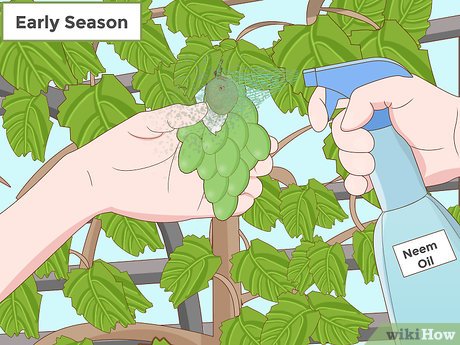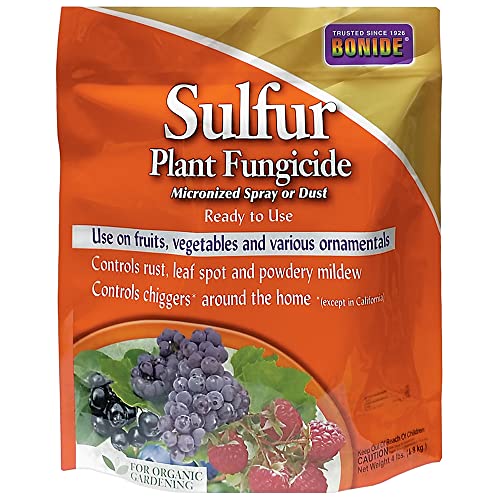Insecticide For Grapes
While a powerful burst of water may keep away certain plant pests, grape pests are usually hardier and require the use of pesticides to keep their numbers in check. One of four types of pesticides typically controls most grape pests, although a variety of chemicals may be needed for insects that have multiple generations. Always follow the manufacturer’s application rates, and always wear long sleeves, eye protection and an air filtration mask when applying pesticides.
Horticultural Oils and Neem Oil
-
Horticultural oils and neem oil serve as two of the safest — as far as honeybees and natural predators of problem pests are concerned — and more environmentally friendly ways of controlling certain pests. The oils typically do not control pests as well as more toxic chemicals, but they will keep numbers in check unless an infestation has overwhelmed your vineyard. Spider mites, thrips, European fruit lecanium scale and black widow spiders all fall victim to horticultural oils or neem oils. In general, oils work best early in the season, prior to eggs hatching and infestation problems occurring. Apply the oils liberally onto the vine, as contact with the pests is essential.
Spinosad
-
Spinosad is a highly toxic chemical that reacts both on contact and when ingested by the targeted pest. Spinosad is most effective on grape pests that have just entered the larval stage, so the effectiveness of the chemical is directly tied to application timing. Spinosad controls the larvae of cutworms, western grapeleaf skeletonizers, light brown apple moths, thrips, grape leaffolder, orange tortrix and omnivorous leafroller. Spinosad can kill honeybees, so the University of California suggests applying the chemical during the night or morning hours. In the case of a severe infestation, you may reapply spinosad five days after the first application, following the manufacturer’s label rates.
Carbaryl
-
Effective at killing many of the same insects as spinosad, and a few more that spinosad doesn’t take care of, carbaryl is a harsher chemical that’s extremely deadly to honeybees. Because carbaryl can increase mite numbers, never use it where mites are already an issue. It’s effective against branch and twig borers, cutworms, grape leaffolder, hoplia beetles, omnivorous leafroller and orange tortrix. The University of California Integrated Pest Management suggests using carbaryl only when grape vines are in their growing season for orange tortrix and during the second generation for omnivorous leafrollers.
Imidacloprid
-
Imidacloprid works by adversely affecting an insect’s central nervous system. It does not result in immediate death, but eventually will cause the insect to become paralyzed and then die. It extremely toxic to bees and can be harmful to birds and other animals, but it is one of the most effective pesticides to use on many pests. It affects ants, European fruit lecanium scales, ants, grape phylloxera, mealybugs, sharpshooters, leafhoppers, thrips, vine mealybugs and western grapeleaf skeletonizers. You may apply imidacloprid as a foliar spray or soil soak for most insects, although the pesticide comes in a liquid ant bait form for ants.
Stubborn Pests
-
Pests that have multiple generations often require multiple treatments per year and sometimes alternated pesticide types. These insects include European fruit lecanium scales, mealybugs, omnivorous leafroller, orange tortrix and vine mealybugs. Narrow-range oil kills off both generations of European fruit lecanium scales, but imidacloprid only works well against mealybugs in spring, while an application of buprofezin should be made in summer. Spinosad kills the first, second and third generation of omnivorous leafrollers, and both generations of orange tortrix. Vine mealybugs are the most troublesome, and have up to seven generations a year. Applying narrow-range oil at the very start of spring and then using imidacloprid in summer, or splitting up two applications of imidacloprid between when the vine’s bloom period and in the middle of summer, works best. Grape bud beetles and vinegar flies do not respond to carbaryl, imidacloprid, horticultural oils or spinosad. Pyrethrin works well against vinegar flies, while phosmet or dimethoate takes care of grape bud beetles. No pesticide specifically targets leadcable borer, blackvine weevils or click beetles, but they usually appear with other insects and are affected by pesticides that affect those insects.
Insecticide For Grapes
Insecticides for grape vines can be divided into two broad categories: systemic and non-systemic.
Systemic insecticides are chemicals that are taken up by the plant’s vascular system and transported to wherever they are needed. This means that the chemical is manufactured inside of the plant, and it cannot be washed away by rain or water. The advantage of this method is that it will kill insects like aphids, spider mites and scale insects that infest the interior of the plant without killing bees or other beneficial insects. These products will also protect against fungal diseases caused by powdery mildew or downy mildew.
Non-systemic insecticides are applied directly to the foliage of plants, including grapes. These products have not been absorbed into the plant’s vascular system, so they can be easily washed off by rain or irrigation. Because they do not have any systemic effect on plants, they do not have any effect on beneficial organisms such as bees which may visit your garden while they are in bloom; however they can still protect against pests such as spider mites if applied correctly each week during their growing season (typically April through September).
List Of Insecticide For Grapes
- FOLIAGE PROTECTOR – Protects a wide range of vegetation including apples, pears, cherries, eggplant, beans, tomatoes, petunias, roses, and many more fruit, nut, and ornamental trees.
- CONTROLS A VARIETY OF INSECTS AND DISEASES – This pest control is great for use on aphids, Japanese beetles, leafhoppers, ants, crickets, cockroaches, and other pests. It also controls powdery mildew, apple scab, flyspeck, black mold and many more.
- COMPLETE COVERAGE – This product is a complete concentrate that contains insecticide, fungicide, miticide, aphicide, and scalicide. Designed specifically to protect home orchards from the ravages of listed insects and diseases.
- PERFECT FOR ALL SKILL LEVELS – Fruit Tree and Plant Guard Concentrate is an excellent multi-purpose product for hobby home orchardists of all skill levels.
- NEEDS TO BE MIXED – This product arrives as a concentrate that needs to be mixed before application. Depending on the desired results, there are various mixing rates for each plant. Make sure to read all directions on the label before use.
Additional Info :
| Color | Brown/A |
| Item Dimensions | |
| Height | 1 Inches |
| Width | 1 Inches |
| Length | 1 Inches |
| Weight | 1 Pounds |
- CONTROLS A VARIETY OF INSECTS AND DISEASES – Sulfur Plant Fungicide is effective against rust, leaf spot, powdery mildew, chiggers, thrips, scale, and listed mites.
- USE ON FRUITS, VEGETABLES, AND ORNAMENTALS – Product is approved for organic gardening and can be used on apples, beans, cherries, berries, peas, grapes, strawberries, and many more fruits and vegetables in your garden.
- SAFE FOR ANIMALS – Helps control fleas and ticks on dogs, horses, cattle, swine, sheep, and goats. Can also be used to control depluming mites on chickens, turkeys, ducks, geese, pigeons, and other game birds.
- GREATER EFFICIENCY – The extremely fine particle size contributes to a uniform film-forming layer, better adhesion and more even distribution of particles over fruit and leaf surfaces, resulting in greater efficiency.
- READY TO USE – This product is conveniently ready to use when it arrives. It can be applied to plants as either a micronized liquid spray or dust.
Additional Info :
| Color | Ready-to-Use |
| Item Dimensions | |
| Height | 9 Inches |
| Width | 2.5 Inches |
| Length | 6.5 Inches |
| Weight | 4 Pounds |
- FOR GARDENS: Multi-purpose formula cures and prevents all major diseases on roses, flowers and ornamental shrubs
- RAINPROOF: Can’t be washed off by rain once the spray is dry
- USE ON: Protects fruits, nuts, vegetables, trees, lawns and ornamentals
- CONCENTRATE: Choose a spray application method and mix with water as directed
- The power is in your hands to keep your landscape in line – unleash it with Spectracide lawn and garden products
Additional Info :
| Color | Yellow |
| Item Dimensions | |
| Height | 8.3 Inches |
| Width | 3.7 Inches |
| Length | 2.2 Inches |
| Weight | 1.2 Pounds |
- MAXIMUM STRENGTH READY TO USE SPRAY – No mixing required. Trifecta Crop Control Ready To Use is diluted at maximum strength 2oz per gallon ratio. Simply point and spray and thoroughly wet the plants until foliage is dripping including the underside of the leaves and the surface of the growing medium.
- EASY SOLUTION TO HELP BEAT MILDEW, MITES, AND MOLD – Crop Control is the natural growers’ choice to help protect and cure Powdery Mildew, Spider Mites, Russet Mites, Broad Mites, Botrytis, Grey Mold, Aphids, fungal and parasitic species on plants.
- SAFE FOR USE ON MOST PLANTS – Use for most crops including fruits, vegetables, herbs, spices, roses, flowers, trees, shrubs, houseplants, succulents, ornamentals and more. Save time and money with this quick and easy solution to mildew, mold, and fungus. *Test spray a few leaves full application*
- FARMER RECOMMENDED – Unique blend of food-grade PREMIUM essential oils including garlic, thyme, clove and peppermint oils broken down to NANO-SIZE particles for MAXIMUM COVERAGE. Crop Control is made with natural food-grade ingredients so you can feel good about what you are putting on your plants and the planet.
- GUARANTEED TO WORK FOR YOU – We are totally confident that Trifecta Crop Control will work for you, as it has for thousands of other growers. With your Trifecta Crop Control purchase, you are protected by Amazon’s money-back guarantee (all terms apply) so you can order now with CONFIDENCE.
Additional Info :
- Special formula: specially-formulated to use on over 100 listed fruits, vegetables, and citrus plants to kill insects and prevent new infestations
- Insect killer: kills Asian Citrus Psyllids, aphids, whiteflies, and more
- Season-long protection: one easy application provides season-long protection without spraying
- Rainproof protection: systemic rainproof protection is absorbs and will not wash off
- Systemic rainproof formula
- Treats up to 640 Sq. Ft. of vegetables or up to 9 fruit trees
Additional Info :
| Color | Concentrate |
| Item Dimensions | |
| Height | 10.3 Inches |
| Width | 2.7 Inches |
| Length | 4.7 Inches |
| Weight | 2 Pounds |
| Release Date | 2021-10-19T00:00:01Z |





